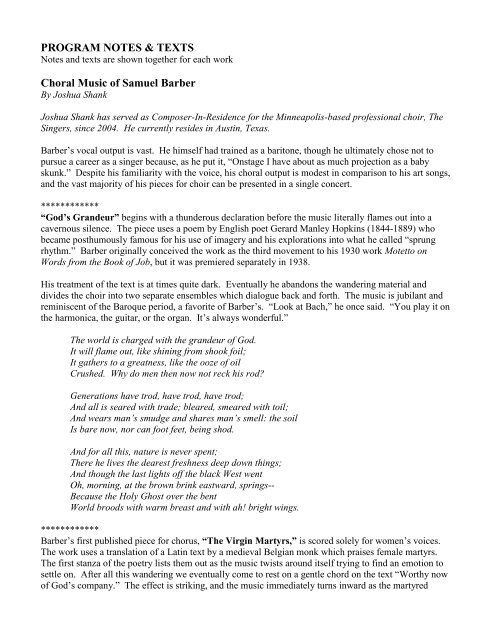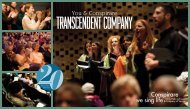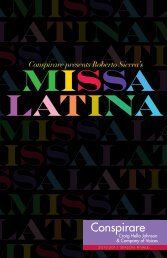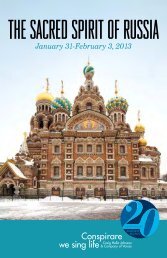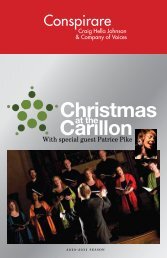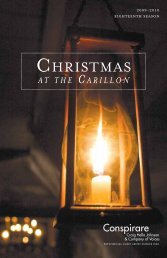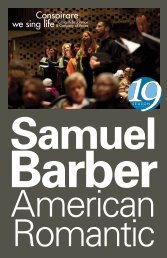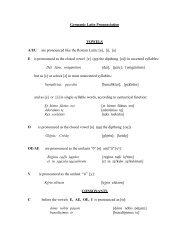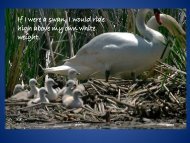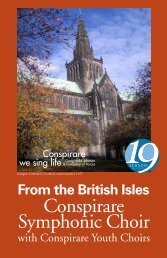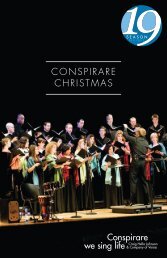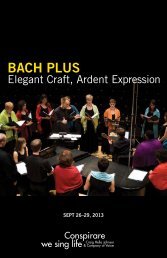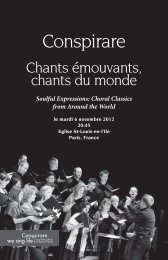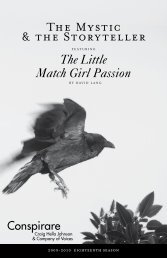PROGRAM NOTES & TEXTS Choral Music of Samuel ... - Conspirare
PROGRAM NOTES & TEXTS Choral Music of Samuel ... - Conspirare
PROGRAM NOTES & TEXTS Choral Music of Samuel ... - Conspirare
Create successful ePaper yourself
Turn your PDF publications into a flip-book with our unique Google optimized e-Paper software.
<strong>PROGRAM</strong> <strong>NOTES</strong> & <strong>TEXTS</strong><br />
Notes and texts are shown together for each work<br />
<strong>Choral</strong> <strong>Music</strong> <strong>of</strong> <strong>Samuel</strong> Barber<br />
By Joshua Shank<br />
Joshua Shank has served as Composer-In-Residence for the Minneapolis-based pr<strong>of</strong>essional choir, The<br />
Singers, since 2004. He currently resides in Austin, Texas.<br />
Barber‟s vocal output is vast. He himself had trained as a baritone, though he ultimately chose not to<br />
pursue a career as a singer because, as he put it, “Onstage I have about as much projection as a baby<br />
skunk.” Despite his familiarity with the voice, his choral output is modest in comparison to his art songs,<br />
and the vast majority <strong>of</strong> his pieces for choir can be presented in a single concert.<br />
************<br />
“God’s Grandeur” begins with a thunderous declaration before the music literally flames out into a<br />
cavernous silence. The piece uses a poem by English poet Gerard Manley Hopkins (1844-1889) who<br />
became posthumously famous for his use <strong>of</strong> imagery and his explorations into what he called “sprung<br />
rhythm.” Barber originally conceived the work as the third movement to his 1930 work Motetto on<br />
Words from the Book <strong>of</strong> Job, but it was premiered separately in 1938.<br />
His treatment <strong>of</strong> the text is at times quite dark. Eventually he abandons the wandering material and<br />
divides the choir into two separate ensembles which dialogue back and forth. The music is jubilant and<br />
reminiscent <strong>of</strong> the Baroque period, a favorite <strong>of</strong> Barber‟s. “Look at Bach,” he once said. “You play it on<br />
the harmonica, the guitar, or the organ. It‟s always wonderful.”<br />
The world is charged with the grandeur <strong>of</strong> God.<br />
It will flame out, like shining from shook foil;<br />
It gathers to a greatness, like the ooze <strong>of</strong> oil<br />
Crushed. Why do men then now not reck his rod?<br />
Generations have trod, have trod, have trod;<br />
And all is seared with trade; bleared, smeared with toil;<br />
And wears man’s smudge and shares man’s smell: the soil<br />
Is bare now, nor can foot feet, being shod.<br />
And for all this, nature is never spent;<br />
There he lives the dearest freshness deep down things;<br />
And though the last lights <strong>of</strong>f the black West went<br />
Oh, morning, at the brown brink eastward, springs--<br />
Because the Holy Ghost over the bent<br />
World broods with warm breast and with ah! bright wings.<br />
************<br />
Barber‟s first published piece for chorus, “The Virgin Martyrs,” is scored solely for women‟s voices.<br />
The work uses a translation <strong>of</strong> a Latin text by a medieval Belgian monk which praises female martyrs.<br />
The first stanza <strong>of</strong> the poetry lists them out as the music twists around itself trying to find an emotion to<br />
settle on. After all this wandering we eventually come to rest on a gentle chord on the text “Worthy now<br />
<strong>of</strong> God‟s company.” The effect is striking, and the music immediately turns inward as the martyred
women gather up flowers to make a bouquet “for love.”<br />
It‟s worth noting that Barber wrote this piece in 1935 at the age <strong>of</strong> 25. Women in the United States had<br />
only had the right to vote for 15 years at this point so his choice <strong>of</strong> subject matter – an elegy for female<br />
saints – is interesting to note in that context.<br />
Therefore come they, the crowding maidens,<br />
Gertrude, Agnes, Prisca, Cecily,<br />
Lucy, Thekla, Juliana, Barbara,<br />
Agatha, Petronel, and other maids<br />
Whose names I have read not and now record not,<br />
But their souls and their faith were maimed not.<br />
Worthy now <strong>of</strong> God’s company.<br />
Wand’ring through the fresh fields go they,<br />
Gath’ring flowers to make them a nosegay<br />
Gath’ring roses red for the Passion,<br />
Lilies and violets for love.<br />
************<br />
“Let down the bars, O death” was written in the same summer as the landmark string quartet which<br />
eventually yielded the Adagio for Strings, and while that orchestral work went on to become synonymous<br />
with grief, its choral sibling is the one <strong>of</strong> the two that was actually performed at Barber‟s funeral in 1981.<br />
Of that event, Gian Carlo Menotti recalled:<br />
“He had a wonderful sense <strong>of</strong> humor, and he loved to shock people with unconventional<br />
phrases and actions. He loved good food, and one <strong>of</strong> his favorite things was a good<br />
soup with French croutons sprinkled on. He said: „When I die, please remember I don‟t<br />
want flowers, I just want croutons. Get a sack <strong>of</strong> croutons and sprinkle them over my<br />
c<strong>of</strong>fin.‟ That we did. Some friends <strong>of</strong> his baked some bread and made croutons. I<br />
didn‟t have the courage to do it, but as his c<strong>of</strong>fin was lowered three <strong>of</strong> his friends<br />
sprinkled croutons. I could just see Sam laughing.”<br />
There is no trace <strong>of</strong> the impish side <strong>of</strong> Barber in “Let down the bars, O death.” In fact, he seems to have<br />
made an effort to stay out <strong>of</strong> the way <strong>of</strong> Emily Dickinson‟s text altogether. The composer – who was<br />
extraordinarily adept at writing complicated, interlocking counterpoint – set her poem as a simple chorale.<br />
The piece lasts only 30 measures and <strong>of</strong> its eight lines only two ever repeat: “Let down the bars, O Death<br />
– The tired Flocks come in.” At first we hear them as an invocation sung in hushed tones that crescendo<br />
into the remainder <strong>of</strong> the work. When he eventually brings the same music back, it is unchanged except<br />
that the dynamics are now in reverse. The whisper that began the work is now a declamation, meant to<br />
shout open the door before letting Dickinson‟s “tired flocks” gently slip away.<br />
Let down the bars, O Death!<br />
The tired flocks come in,<br />
Whose bleating ceases to repeat,<br />
Whose wandering is done.<br />
Thine is the stillest night,<br />
Thine the securest fold;
Too near thou art for seeking thee,<br />
Too tender to be told.<br />
************<br />
The remaining three movements <strong>of</strong> Motetto on Words from the Book <strong>of</strong> Job feature Biblical excerpts<br />
rendered in fairly simple forms: a plodding march, a frenetic madrigal paired with a lamentation, and a<br />
capricious song that lives up to its title. They are young works to be sure, but when we‟re reminded that<br />
only six years later Barber would go on to write the most enduring orchestral work in American music,<br />
these brief pieces (written at the age <strong>of</strong> 20) take on a fascinating significance.<br />
There the wicked cease<br />
There the wicked cease from troubling,<br />
And the weary be at rest;<br />
There the prisoners rest together,<br />
They hear not the voice <strong>of</strong> th’oppressor.<br />
The small and the great are there,<br />
And the servant is free from his master.<br />
-Job 3:17-19<br />
Call now!<br />
Call now, if there be any that will answer thee!<br />
And to which <strong>of</strong> the saints wilt thou turn?<br />
Canst thou by searching find out God?<br />
He is as high as heav’n; what canst thou do?<br />
Deeper than hell; what canst thou know?<br />
Yet man is born to trouble,<br />
As the sparks fly upward.<br />
I would seek unto God.<br />
-Job 5:1, 11:7-8, 5:7-8<br />
Praise Him!<br />
Praise Him! Then shalt thou forget thy misery,<br />
And remember it as waters pass’d away.<br />
And thou shalt be secure because there is peace!<br />
Thou shalt shine forth, thou shalt be as the morning!<br />
Praise Him! Amen.<br />
-Job 9:16-17<br />
************<br />
“Twelfth night” begins with the line “No night could be darker than this night,” and the strained,<br />
sometimes dissonant music never looks back. Here Barber paints anguish and despair over a text by<br />
English poet Laurie Lee (1914-1997) which joins Christ‟s birth to the earth‟s reawakening from “utter<br />
death.” At the mention <strong>of</strong> “men with shepherd‟s eyes,” the music tightens like a vice before building to a<br />
climax a few pages later. The piece ends on a defeated note; repeating the same lonely text that began it.<br />
No night could be darker than this night,<br />
No cold so cold,<br />
As the blood snaps like a wire,<br />
And the heart’s sap stills,
And the year seems defeated.<br />
O never again, it seems, can green things run,<br />
Or sky birds fly,<br />
Or the grass exhale its humming breath,<br />
Powdered with pimpernels,<br />
From this dark lung <strong>of</strong> winter.<br />
Yet here are lessons for the final mile<br />
Of pilgrim kings;<br />
The mile still left when all have reached<br />
Their tether’s end:<br />
That mile where the Child lies hid.<br />
For see, beneath the hand,<br />
The earth already warms and glows;<br />
For men with shepherd’s eyes<br />
There are signs in the dark,<br />
The turning stars,<br />
The lamb’s returning time.<br />
Out <strong>of</strong> this utter death he’s born again,<br />
His birth our saviour;<br />
From terror’s equinox he climbs and grows,<br />
Drawing his finger’s light across our blood<br />
The sun <strong>of</strong> heaven,<br />
And the son <strong>of</strong> god.<br />
************<br />
“To Be Sung on the Water” begins with hollow harmonies similar to its predecessor, but Barber quickly<br />
takes us someplace else. Here the tenors and basses repeat three words (as if to suggest the sound <strong>of</strong> oars<br />
rippling in the water) while the sopranos and altos take on the bulk <strong>of</strong> a text by American poet Louise<br />
Bogan (1897-1970). The men briefly give up their rowing duties to the women, but over the course <strong>of</strong> the<br />
movement these two sections <strong>of</strong> the choir never sing anything together. There is an unnamed distance<br />
between them – which perhaps we‟re not meant to know – but in the end it seems to be given voice in the<br />
resigned, melancholy chord that finishes the piece.<br />
Beautiful, my delight,<br />
Pass, as we pass the wave,<br />
Pass, as the mottled night<br />
Leaves what it cannot save,<br />
Scattering dark and bright.<br />
Beautiful, pass and be<br />
Less than the guiltless shade<br />
To which our vows were said;<br />
Less than the sound <strong>of</strong> an oar<br />
To which our vows were made,<br />
Less then the sound <strong>of</strong> its blade
Dipping the stream once more.<br />
************<br />
Barber conducted the premiere <strong>of</strong> “A stopwatch and an ordnance map” himself. At the time he was<br />
directing the Madrigal Chorus at his alma mater The Curtis Institute, and decided to write a piece for the<br />
men <strong>of</strong> the ensemble. The work also includes a timpanist and uses a text by the English poet Stephen<br />
Spender (1909-1995), which describes the death <strong>of</strong> a soldier in the Spanish Civil War. The music is<br />
intentionally spooky with an air <strong>of</strong> dread ruling the proceedings. A review from a 1943 performance in<br />
the National Gallery called it “sinister…with a threat <strong>of</strong> disaster in every measure.”<br />
“A stopwatch and an ordnance map” was premiered on January 28, 1940. Five months earlier, Germany<br />
had invaded Poland. Barber served in the Air Force during the war, and as part <strong>of</strong> his duties was tasked to<br />
move pianos and heavy, old radios that had outlived their use. He was eventually commissioned by the<br />
military to write his (now withdrawn) Symphony Dedicated to the Air Force. At one point he was called<br />
on to play the work-in-progress for a commanding <strong>of</strong>ficer and recalled the man saying, “Well, corporal,<br />
it‟s not quite what we expected from you. Since the Air Force uses all sorts <strong>of</strong> the most modern technical<br />
devices, I hope you‟ll write this symphony in quarter-tones. But do what you can, do what you can,<br />
corporal.”<br />
Perhaps he should have shown the man “A stopwatch…” instead. Immediately before the men begin<br />
singing “He stayed faithfully in that place,” the timpanist sets about sliding the pitches <strong>of</strong> the drums with<br />
the tuning pedals and Barber, a composer who was looked at as somewhat old-fashioned during his<br />
lifetime, sounds decidedly “modern.”<br />
A stopwatch and an ordnance map.<br />
At five a man fell to the ground<br />
And the watch flew <strong>of</strong>f his wrist<br />
Like a moon struck from the earth<br />
Marking a blank time that stares<br />
On the tides <strong>of</strong> change beneath.<br />
All under the olive trees.<br />
A stopwatch and an ordnance map.<br />
He stayed faithfully in that place<br />
From his living comrade split<br />
By dividers <strong>of</strong> the bullet<br />
Opening wide the distances<br />
Of his final loneliness.<br />
All under the olive trees.<br />
A stopwatch and an ordnance map.<br />
And the bones are fixed at five<br />
Under the moon’s timelessness;<br />
But another who lives on<br />
Wears within his heart forever<br />
Space split open by the bullet.<br />
All under the olive trees.<br />
************
Throughout the 1960s, Barber penned numerous arrangements <strong>of</strong> previously-written material. “Heaven<br />
haven: A nun takes the veil” was originally a song for voice and piano (on a poem by Gerard Manley<br />
Hopkins) from his Four Songs, Op. 13. In its transformation from art song to choral piece, the piano part<br />
was curiously left out by the composer. However, given the desire for refuge in the poetry, perhaps he<br />
felt a pianist might intrude on the delicate music.<br />
I have desired to go<br />
Where springs not fail,<br />
To fields where flies no sharp and sided hail<br />
And a few lilies blow.<br />
And I have asked to be<br />
Where no storms come,<br />
Where the green swell is in the havens dumb,<br />
And out <strong>of</strong> the swing <strong>of</strong> the sea.<br />
************<br />
Written in 1938, “Sure on this shining night” went on to become one <strong>of</strong> the composer‟s most famous<br />
and <strong>of</strong>t-performed art songs before he arranged it for choir thirty years later. Using a text by American<br />
poet James Agee (1909-1955), Barber writes music that is sublime and reverent as it reflects the poetry.<br />
Once the final chord is played, it‟s easy to see why the piece is so beloved by singers.<br />
Sure on this shining night<br />
Of starmade shadows round,<br />
Kindness must watch for me<br />
This side the ground.<br />
The late year lies down the north.<br />
All is healed, all is health.<br />
High summer holds the earth,<br />
Hearts all whole.<br />
Sure on this shining night<br />
I weep for wonder<br />
Wand’ring far alone<br />
Of shadows on the stars.<br />
************<br />
In 1936, Barber wrote his only work for string quartet and almost immediately arranged its second<br />
movement for a full string orchestra. The new piece, Adagio for Strings, was programmed by the famed<br />
Italian conductor Arturo Toscanini – a sort <strong>of</strong> classical kingmaker at the time – and its composer became<br />
an overnight sensation. The Adagio has gone on to become something <strong>of</strong> a universal expression <strong>of</strong> grief,<br />
and in arranging it for choir in 1968, Barber pulls the music even closer to this notion by laying it over<br />
the “Agnus Dei” from the Roman Catholic mass. The result is a meditation which unfolds itself in<br />
endless spirals before the bottom drops out and it rises to a deafening climax. Then the supplicating cries<br />
waft gently back into the ether.<br />
Lamb <strong>of</strong> God, who takes away the sins <strong>of</strong> the world, have mercy upon us.<br />
Lamb <strong>of</strong> God, who takes away the sins <strong>of</strong> the world, have mercy upon us.
Lamb <strong>of</strong> God, who takes away the sins <strong>of</strong> the world, grant us peace.<br />
-sung in Latin<br />
************<br />
Reincarnations is a set <strong>of</strong> three pieces written for the Curtis Institute Madrigal Chorus which he<br />
conducted from 1938-1941. That title doesn‟t refer to the subject matter <strong>of</strong> the three texts by Irish poet<br />
James Stephens (1882-1950) but instead refers to the entire set <strong>of</strong> poems Stephens wrote based on the<br />
work <strong>of</strong> 19 th century poet Anthony Raftery. Stephens could barely speak Gaelic so, when he set out to<br />
translate Raftery‟s work, he wound up with something more than just simple translations. He called the<br />
results a set <strong>of</strong> “reincarnations.”<br />
“Mary Hynes” is named after a woman purported to be the most beautiful in all <strong>of</strong> western Ireland and<br />
Barber sets the text with a sort <strong>of</strong> ecstatic lyricism. He slows the singers down for the second stanza and<br />
forces them to tread lightly before they settle into the billowy final phrase on the word “airily.”<br />
She is the sky <strong>of</strong> the sun!<br />
She is the dart <strong>of</strong> love!<br />
She is the love <strong>of</strong> my heart!<br />
She is a rune!<br />
She is above the women <strong>of</strong> the race <strong>of</strong> Eve,<br />
As the sun is above the moon!<br />
Lovely and airy the view from the hill<br />
That looks down Ballylea!<br />
But no good sight is good,<br />
Until you see the blossom <strong>of</strong> the branches<br />
Walking towards you, airily.<br />
************<br />
The character who inspired the poem for “Anthony O’Daly” was an Irish environmentalist unjustly<br />
accused <strong>of</strong> firing a gun at another man. He was eventually condemned, and refusing <strong>of</strong>fers from the<br />
guards to help him escape, went quietly and was hanged. The text focuses almost solely on the sense <strong>of</strong><br />
disbelief at the finality <strong>of</strong> loss, and the resultant music is numb in comparison to anything else in<br />
Reincarnations. The basses sit grief-stricken on a single note for a full 41 measures, and when they<br />
finally take up the melody, it is transformed into a thrashing torrent <strong>of</strong> sound which halts on the word<br />
“grief,” a cold silence experienced at the sudden loss <strong>of</strong> a loved one.<br />
Since your limbs were laid out<br />
The stars do not shine!<br />
The fish leap not out in the waves!<br />
On our meadows<br />
The dew does not fall in the morn,<br />
For O Daly is dead!<br />
Not a flow’r can be born!<br />
Not a word can be said!<br />
Not a tree have a leaf!<br />
Anthony! After you there is nothing to do!
There is nothing but grief!<br />
************<br />
“The Coolin” takes its name from the curly lock <strong>of</strong> blond hair at the nape <strong>of</strong> the neck (which eventually<br />
became used as a nickname for a loved one). Of his poem, James Stephens said, “I sought to represent<br />
that state which is almost entirely a condition <strong>of</strong> a dream, wherein the passion <strong>of</strong> love has almost<br />
overreached itself, and is sinking to a motionless languor.” Barber seems to have taken him at his word<br />
and the music is luxuriant and warm. We dwell for a moment at the edge <strong>of</strong> the phrase “And a lip to find<br />
out a lip,” before tenderly fading back into the same music which opened the movement.<br />
Come with me, under my coat,<br />
And we will drink our fill<br />
Of the milk <strong>of</strong> the white goat,<br />
Or wine if it be thy will.<br />
And we will talk until talk is a trouble too,<br />
Out on the side <strong>of</strong> the hill;<br />
And nothing is left to do,<br />
But an eye to look into an eye,<br />
And a hand in a hand to slip;<br />
And a sigh to answer a sigh;<br />
And a lip to find out a lip!<br />
What if the night be black,<br />
Or the air on the mountain chill,<br />
Where all but the fern is still!<br />
Stay with me, under my coat,<br />
And we will drink our fill<br />
Of the milk <strong>of</strong> the white goat,<br />
Out on the side <strong>of</strong> the hill!<br />
“The Lovers” will be performed before “Easter <strong>Choral</strong>e”<br />
************<br />
“Easter <strong>Choral</strong>e” was commissioned in honor <strong>of</strong> the dedication <strong>of</strong> the massive central tower <strong>of</strong> the<br />
National Cathedral in May <strong>of</strong> 1964 and originally appeared as a work for brass and timpani. Later that<br />
year, Barber added choral parts on a text by Pack Browning. The text features numerous references to<br />
nature (a common theme in the composer‟s work) as a symbol <strong>of</strong> the risen Christ, which Barber enlivens<br />
through his music while never distracting from the poetry. Robert Kyr‟s new version <strong>of</strong> “Easter <strong>Choral</strong>e”<br />
uses the contrasting sections <strong>of</strong> the thirteen-player chamber orchestra (woodwinds, brass, strings) to color<br />
each verse <strong>of</strong> the text, gradually building in intensity until the final proclamation rings out in triumphant<br />
majesty: "We listen to the live earth sing/And praise our loving Source and Spring."<br />
The morning light renews the sky.<br />
Across the air the birds ignite<br />
Like sparks to take this blaze <strong>of</strong> day<br />
Through all the precincts <strong>of</strong> the night.<br />
Alleluia! Alleluia!<br />
The first <strong>of</strong> dawn refresh our eyes.
We watch the world grow wide and bright<br />
And praise our newly risen Light.<br />
The winter land receives the year.<br />
Her smallest creatures rouse and cling<br />
To swelling roots and buds that stir<br />
The restless air to reel and ring!<br />
Alleluia! Alleluia!<br />
The sounds <strong>of</strong> waking fill our ears.<br />
We listen to the live earth sing<br />
And praise our loving Source and Spring.<br />
**************<br />
The Lovers<br />
<strong>Music</strong> by <strong>Samuel</strong> Barber, new chamber version by Robert Kyr<br />
Notes by Robert Kyr<br />
When Craig Hella Johnson asked me to create a new version <strong>of</strong> <strong>Samuel</strong> Barber‟s The Lovers for baritone,<br />
chamber chorus, and chamber orchestra, I was overjoyed. First, I consider The Lovers (on poetry <strong>of</strong> Pablo<br />
Neruda) to be one <strong>of</strong> the few American choral-orchestral masterworks <strong>of</strong> the twentieth century.<br />
Moreover, I have always felt that it would receive many more performances in a smaller version that is<br />
better suited to the sublime intimacy <strong>of</strong> Neruda‟s poetry.<br />
Barber created The Lovers during the years when his longtime romantic and domestic partnership with<br />
Gian Carlo Menotti (the acclaimed opera composer) was deteriorating (1969-71), and he was still haunted<br />
by the failure <strong>of</strong> Antony and Cleopatra at the Metropolitan Opera (1966). His life experience is reflected<br />
in the despair <strong>of</strong> Neruda‟s poetic exploration <strong>of</strong> love (both erotic and spiritual) and its loss, which might<br />
also relate to his romance with Valentin Herranz, to whom the work is dedicated and who suggested the<br />
text to him. (Later, Valentin became Barber‟s personal assistant and valet until the end <strong>of</strong> his life.)<br />
When you hear the music, imagine the anguish <strong>of</strong> its composer as he faced these difficulties and gradually<br />
became overwhelmed by his unconscious wounds and vulnerabilities, which further stoked the fires <strong>of</strong><br />
love gone wrong. And into this toxic brew, mix his suffering from the societal prejudice against<br />
homosexuality, as well as his worsening alcoholism.<br />
Given this context, one better understands why Barber chose Neruda‟s passionate song <strong>of</strong> despair, and<br />
why the music connects us so vividly to a situation that no one can escape. In some sense, our greatest<br />
loves remain with us equally and always – those we kept and those we lost. In this regard, Barber‟s<br />
musical approach to the text ultimately helps us to heal our losses for the purpose <strong>of</strong> more fully<br />
experiencing the totality <strong>of</strong> love in all <strong>of</strong> its joys and sorrows.<br />
In light <strong>of</strong> this understanding, I have strived to create a more playable and affordable version <strong>of</strong> Barber‟s<br />
masterpiece without sacrificing any <strong>of</strong> its spiritual intensity. While I have not changed a single note or<br />
rhythm <strong>of</strong> the vocalists, the orchestral music has been radically transformed: the sound <strong>of</strong> a gargantuan<br />
eighty-piece ensemble has been morphed into a fifteen-player chamber orchestra. This sonic magic act is<br />
intended to give a stronger presence to the sensuality and intimacy <strong>of</strong> Neruda‟s visionary poetry.
My new version <strong>of</strong> The Lovers is dedicated to Craig Hella Johnson, David Farwig, and <strong>Conspirare</strong>, and to<br />
the memory <strong>of</strong> Lee Hoiby, who was a devoted champion <strong>of</strong> Barber‟s music.<br />
I. Body <strong>of</strong> a woman<br />
Body <strong>of</strong> a woman, white hills, white thighs,<br />
You look like a world, lying in surrender.<br />
My rough peasant’s body digs in you,<br />
And makes the son leap from the depth <strong>of</strong> the earth.<br />
I was alone –like a tunnel, the birds fled from me,<br />
And night swamped me with its crushing invasion.<br />
To survive myself I forged you like a weapon,<br />
Like an arrow in my bow, a stone in my sling.<br />
But the hour <strong>of</strong> vengeance falls and I love you.<br />
Body <strong>of</strong> skin, <strong>of</strong> moss, <strong>of</strong> eager and firm milk.<br />
Oh the goblets <strong>of</strong> the breast! Oh the eyes <strong>of</strong> absence!<br />
Oh the roses <strong>of</strong> the pubis! Oh your voice, slow and sad!<br />
Body <strong>of</strong> my woman, I will persist in your grace.<br />
My thirst, my boundless desire, my shifting road!<br />
Dark river-beds where the eternal thirst flows<br />
And weariness follows, and the infinite ache.<br />
II. Lithe girl, brown girl<br />
Lithe girl, brown girl,<br />
The sun that makes apples,<br />
And stiffens the wheat,<br />
And splits the thongweed,<br />
Made your body with joy.<br />
Your tongue like a red bird<br />
Dancing on ivory,<br />
Your lips with the smile <strong>of</strong> water.<br />
You stretch out your arms<br />
And the sun grabs<br />
At the loose black coils<br />
Of your hair<br />
As if water were falling.<br />
Tantalize the sun if you dare,<br />
It will leave<br />
Shadows that match you everywhere.<br />
Lithe girl, brown girl,<br />
Lithe girl, brown girl,<br />
Nothing draws me towards you,<br />
And the heat within you<br />
Beats me home<br />
Like the sun at high noon.
Knowing these things,<br />
Perhaps through knowing these things<br />
I seek you out.<br />
Ah! Listening for your voice<br />
Or the brush <strong>of</strong> your arms against wheat<br />
Or your steps among poppies<br />
Grown under water.<br />
III. In the hot depth <strong>of</strong> this summer<br />
In the hot depth <strong>of</strong> this summer<br />
The morning is close, storm-filled.<br />
Clouds shift: white rags waving goodbye,<br />
Shaken by the frantic wind as it goes.<br />
And as it goes the wind throbs over us<br />
Whom love-making has silenced.<br />
IV. Close your eyes<br />
Close your eyes wherein the slow night stirs,<br />
Strip <strong>of</strong>f your clothes. (O frightened statue!)<br />
Like new-cut flowers your arms, your lap as rose.<br />
Close your eyes wherein the slow light stirs,<br />
Breasts like paired spirals,<br />
Lap as rose, and rosy shadows in your thighs.<br />
The slow night stirs within your eyes,<br />
My quiet one.<br />
Rainfall. From the sea a stray gull.<br />
The rain walks barefoot through the street.<br />
Leaves on the trees are moaning like the sick.<br />
Though the white bee has gone<br />
That part <strong>of</strong> me the world calls soul<br />
Still hums and the world is not so wide<br />
I cannot hear its bell<br />
Turn in the spirals <strong>of</strong> grey wind.<br />
My quiet one. Strip <strong>of</strong>f your clothes.<br />
My quiet one.<br />
V. The Fortunate Isles<br />
Drunk as drunk on trementine<br />
From your open kisses,<br />
Your wet body wedged<br />
Between my wet body and the strake<br />
Of our boat that is made out <strong>of</strong> flowers,<br />
Feasted, we guide it –our fingers<br />
Like tallows adorned with yellow metal –<br />
Over the sky’s hot trim,
The day’s last breath in our sails.<br />
Pinned by the sun between solstice<br />
And equinox, drowsy and tangled together<br />
We drifted for months and woke<br />
with the bitter taste <strong>of</strong> land on our lips,<br />
Eyelids all sticky, and we longed for lime<br />
And the sound <strong>of</strong> a rope<br />
Lowering a bucket down its well. Then,<br />
We came by night to the Fortunate Isles,<br />
And lay like fish<br />
Under the net <strong>of</strong> our kisses.<br />
VI. Sometimes<br />
Sometimes it’s like<br />
You are dead<br />
When you say nothing.<br />
Or you heard things I say, and<br />
Could not be bothered to reply.<br />
And your eyes, sometimes,<br />
Move outside <strong>of</strong> you,<br />
Watching the two <strong>of</strong> us, yes,<br />
As if after you turned to the wall,<br />
Somebody’s kisses stopped your mouth.<br />
VII. We have lost even this twilight<br />
We have lost even this twilight.<br />
No one saw us this evening hand in hand<br />
While the blue night dropped on the world.<br />
I have seen from my window<br />
The fiesta <strong>of</strong> sunset in the distant mountaintops.<br />
I remembered you with my soul clinched<br />
In that sadness <strong>of</strong> mine that you know.<br />
Where were you then?<br />
Who else was there?<br />
Saying what words?<br />
Why does the whole <strong>of</strong> love come on me suddenly<br />
When I am sad and feel you far away?<br />
The book I read each night fell down,<br />
And my coat fell down<br />
Like a hurt dog at my feet.<br />
Each dusk you drew further out,<br />
Out where the dusk shifts, masking statues.
VIII. Tonight I can write<br />
Tonight I can write the saddest lines.<br />
Write, for example: "The night is starry<br />
And the blue stars shiver in the distance."<br />
The nightwind revolves in the sky and sings.<br />
Tonight I can write the saddest lines.<br />
I loved her and sometimes she loved me too.<br />
Through nights like this I held her in my arms.<br />
I kissed her so many times under the infinite sky.<br />
She loved me, sometimes I loved her too.<br />
How could one not have loved her great staring eyes?<br />
Tonight I can write the saddest lines.<br />
To think that I do not have her. To feel that I have lost her.<br />
What does it matter that my love could not keep her?<br />
The night is starry and she is not with me.<br />
This is all. Far away someone is dreaming. Far away.<br />
The same night that makes the same trees white.<br />
We, <strong>of</strong> that time, are no longer the same.<br />
I no longer love her, it is true, but how much I loved her!<br />
Another’s. She will be another’s. As she was before my kisses.<br />
Her voice, her bright body. her infinite eyes.<br />
I no longer lover her, it is true, but maybe I love her...<br />
Love is so short, forgetting is so long.<br />
Even though this be the last pain that she cause me<br />
And these the last verses that I write for her.<br />
IX. Cemetery <strong>of</strong> kisses<br />
Cemetery <strong>of</strong> kisses, there is still fire in your tombs,<br />
Still the fruited boughs burn, pecked at by birds.<br />
Oh the bitten mouth, oh the kissed limbs,<br />
Oh the hungering teeth, oh the entwined bodies,<br />
Oh the mad coupling <strong>of</strong> hope and force<br />
In which we merged and despaired.<br />
This was our destiny and it was the voyage <strong>of</strong> our longing.<br />
And in it all our longing fell, in us all was shipwreck!<br />
It is the hour <strong>of</strong> departure, the hard cold hour<br />
That night enforces on all timetables.<br />
Forsaken like the wharves at dawn.<br />
Oh farther than everything! Oh farther than everything!<br />
It is the hour <strong>of</strong> departure. Forsaken!


